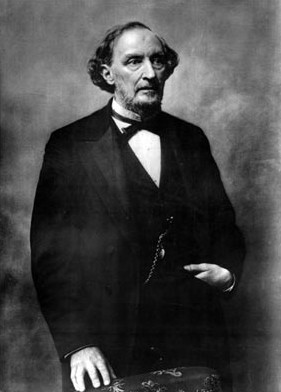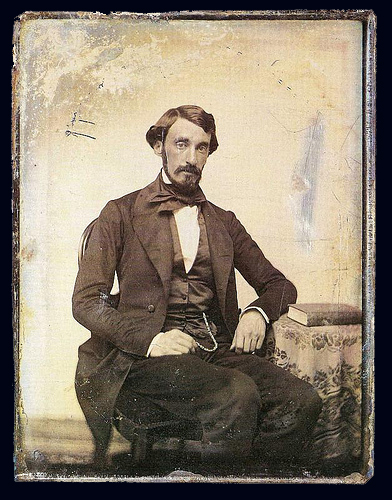<Back to Index>
- Astronomer Charles Messier, 1730
- Writer Pearl Sydenstricker Buck, 1892
- 6th President of Argentina Bartolomé Mitre, 1821
PAGE SPONSOR


Bartolomé Mitre (June 26, 1821 – January 19, 1906) was an Argentine statesman, military figure, and author. He was the President of Argentina from 1862 to 1868.
Mitre was born in Buenos Aires to a Greek Argentine family originally named Mitropoulos.
As a liberal, he was an opponent of Juan Manuel de Rosas, and he was forced into exile. He worked as a soldier and journalist in Uruguay as a supporter of General Fructuoso Rivera, who named Mitre Lieutenant Coronel of the Uruguayan Army in 1846. Mitre later lived in Bolivia, Peru, and Chile, and in the latter country, he collaborated with legal scholar and fellow Argentine exile Juan Bautista Alberdi in the latter's periodical, El Comercio of Valparaíso. Mitre returned to Argentina after the defeat of Rosas at the 1852 Battle of Caseros. He was a leader of the revolt of Buenos Aires against Justo José de Urquiza's federal system, and was appointed to important posts in the provincial government after Buenos Aires seceded from the Confederation. The civil war of 1859 resulted in Mitre's defeat by Urquiza at the battle of Cepeda, in 1860. Issues of customs revenue sharing were settled, and Buenos Aires reentered the Argentine Confederation. Victorious at the 1861 Battle of Pavón,
however, Mitre obtained important concessions from the national army,
notably the amendment of the Constitution to provide for indirect
elections through an electoral college. In
October 1862, Mitre was elected president of the republic, and national
political unity was finally achieved; a period of internal progress and
reform then commenced. During the War of the Triple Alliance, Mitre was initially named the head of the allied forces. Mitre was also the founder of La Nación, one of South America's leading newspapers, in 1870. His opposition to Autonomist Party nominee Adolfo Alsina,
whom he viewed as a veiled Buenos Aires separatist, led Mitre to run
for the presidency again, though the seasoned Alsina outmaneuvered him
by fielding Nicolás Avellaneda, a moderate lawyer from remote Catamarca Province. The electoral college met on April, 12, 1874, and awarded Mitre only three provinces, including Buenos Aires. Mitre took up arms again. Hoping to prevent Avellaneda's October 12 inaugural, he mutineered a gunboat; he was defeated, however, and only President Avellaneda's commutation spared his life. Following the 1890 Revolution of the Park, he broke with the conservative National Autonomist Party (PAN) and co-founded the Civic Union with reformist Leandro Alem.
Mitre's desire to maintain an understanding with the ruling PAN led to
the Civic Union's schism in 1891, upon which Mitre founded the National Civic Union, and Alem, the Radical Civic Union (the oldest existing party in Argentina). He
dedicated much of his time in later years to writing. According to some
of his critics, as a historian Mitre took several questionable actions,
often ignoring key documents and events on purpose in his writings.
This caused his student Adolfo Saldías to distance himself from him, and for future revisionist historians such as José María Rosa to question the validity of his work altogether. He also wrote poetry and fiction, and translated Dante's La divina commedia (The Divine Comedy) into Spanish. On his passing in 1906, he was interred in La Recoleta Cemetery in Buenos Aires. January 19, 2006 marked the centenary of Mitre's death. Mitre
ranks as one of Argentina's greatest writers. He wrote the best
accounts of South America's wars of independence and published many
works, amongst which are: Historia de Belgrano y de la independencia argentina ["History of Belgrano and of the argentine independence"] (1857; fifth edition, four volumes, 1902); Historia de San Martín y de la emancipatión sudamericana ["History of San Martín"] (1869; third edition, six volumes, 1907); Rimas ["Rimes"] (new edition, 1890); Ulrich Schmidl, primer historiador del Rio de la Plata ["Ulrich Schmidl, first historian of the Rio de la Plata"] (1890).